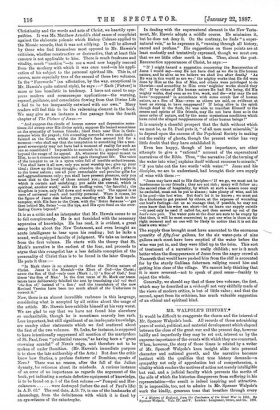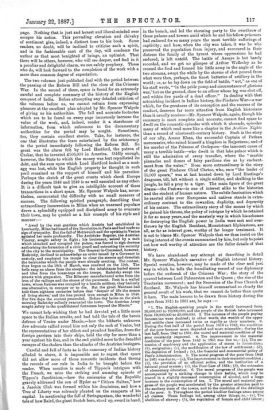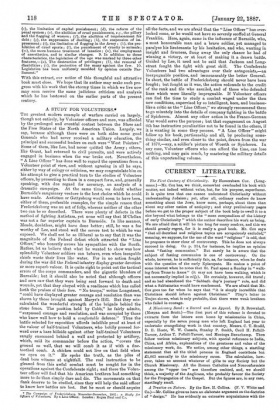MR. WALPOLE'S HISTORY.* IT would be difficult to exaggerate the
charm and the interest of Mr. Spencer Walpole's book. All records of those astonishing years of social, political, and material development which elapsed between the close of the great war and the present day, however baldly and imperfectly they may be set out, interest us by the supreme importance of the events with which they are concerned. When, however, the story of those times is related by a writer of Mr. Spence4 Walpole's keen insight alike into personal character and national growth, and the narrative becomes instinct with the qualities that true history demands—a sympathy not only of approbation but of comprehension, a vitality which renders the motives of action not merely intelligible but real, and a judicial faculty which prevents the merits of the side of which the historian disapproves from suffering in his representation—the result is indeed inspiring and attractive. It is impossible, too, not to admire in Mr. Spencer Walpole's work the kindly, generous tone that breathes through every
• A History of England, from the Conclusion of the Great War in 1815. By Spencer Walpole. Vols. IV. and V. London: Longman, Green, and Co. 1886.
page. Nothing that is just and honest and liberal-minded ever escapes his notice. This pervading elevation and chivalry
of sentiment give, indeed, a distinct tone to his book. Some readers, no doubt, will be inclined to criticise such a spirit, and in the fashionable cant of the day, will condemn the author as that most benighted of beings, an optimist. That there will be others, however, who will see deeper, and find in it a peculiar and delightful charm, we can safely prophesy. Those who do, will look forward to the completion of the work with a
more than common degree of expectation.
The two volumes just published deal with the period between the passing of the Reform Bill and the close of the Crimean War. In the second of these, space is found for an extremely careful and complete summary of the history of the English conquest of India. Before attempting any detailed criticism of the volumes before no, we cannot refrain from expressing pleasure at the excellent plan adopted by Mr. Spencer Walpole of giving us his authorities. The full and accurate footnotes
which are to be found on every page immensely increase the value of the work, and, indeed, render it a storehouse of information, from which references to the documentary authorities for the period may be sought. Sometimes, too, they contain excellent stories. Take, for instance, the one that illustrates the fears entertained by the aristocracy in the period immediately following the Reform Bill. So great was the alarm felt by Lord Hertford, the patron of Croker, that he invested £500,000 in America. Oddly enough, however, the State to which the money was lent repudiated its debt, and the gam upon which Lord Hertford looked as a nest- egg was lost, while the English property he thought in such peril remained as the support of himself and his parasites. Perhaps the sketch of the great events which shook Europe during the years 1848 and 1849 is as well executed as any other.
It is a difficult task to give an intelligible account of these transactions in a short space. Mr. Spencer Walpole has, never- theless, surmounted the difficulty with no small measure of success. The following spirited paragraph, describing that extraordinary insurrection in Milan when an unarmed populace drove a splendidly equipped and disciplined army to evacuate their town, may be quoted as a fair example of his style and manner :—
" Awed by the vast garrison which Austria had established in Lombardy, Milan had heard of the Revolution in Perim and had made no sign of sympathy. But the fall of Metternich and the uprising in Venice agitated her more profoundly. The Archduke Regnier, the Austrian Viceroy, sought safety in flight ; his lieutenant, seized by a mob which attacked and occupied the palace, was forced to sign decrees authorising the formation of a civic guard and entrusting the security of the city to the municipality. The General-in-Command, however, Radetzky, declined to acknowledge an order issued by a Governor in custody, and employed his troops to clear the streets and demolish the barricades which the people were already erecting. The contest, thus begun on the 18th of March, was renewed on the 19th. The bells rang an alarm from the steeples ; the inhabitants hurled stones and tiles from the house-tops on the troops. Radetzky swept the streets with grape-shot. The Milanese manufactured arms from the iron of the railings and the stones of the pavement. Pent in a walled town, whose fortress was occupied by a hostile soldiery, they had only one alternative, to conquer or to die. But the great Mantuan had told them eighteen centuries before that • despair of life the means of living shows,' and the line proved true enough in Milan in 1848. For five days the contest proceeded. Before day broke on the sixth morning Radetzky sullenly evacuated the town. The Austrian Army sought safety in the quadrilateral fortresses beyond the Mincio."
We cannot help wishing that be had devoted yet a little more space to the Italian revolts, and had told the tale of the heroic defence of Venice under Manin,—how the hitherto unknown Jew advocate rallied round him not only the mob of Venice, but the representatives of her oldest and proudest families, drove the foreign garrison into their ships, held the city for more than a year against his foes, and in the end yielded more to the dreadful ravages of the cholera than the attacks of the Austrian besiegers. Careful and full of facts as is the summary of Indian history alluded to above, it is impossible not to regret that space did not allow more of those romantic incidents that throng the records of our rule in India to be brought before the reader. When mention is made of Tippoo's intrigues with the French, we miss the striking and amusing episode of Tippoo's jacobinism,—how the emissaries of the Republic gravely addressed the son of nyder as "Citizen Sultan," how a Jacobin Club was formed within his dominions, and how a Tree of Liberty was solemnly planted on the ramparts of his capital. In mentioning the fall of Seringapatam, the wonderful tale of how Baird, the giant Scotch hero, stood up, sword in hand, in the breach, and led the storming party to the overthrow of those palaces and towers amid which he and his fellow-prisoners had endured for so many years the most terrible sufferings of captivity; and how, when the city was taken, it was he who preserved the population from injury, and succoured in their distress the family of the tyrant whose oppressions he had endured, is left untold. The battle of Assaye is but barely recorded, and we get no glimpse of Arthur Wellesley as he crossed the ford and formed his little army in the angle of the two streams, swept the while by the storms of shot poured from what were then, perhaps, the finest batteries of artillery in the world; or, as he lay down on the field of battle, "not," as one of his staff wrote, "in the pride pomp and circumstance of glorious war,' but on the ground, close to an officer whose leg was shot off, and within five yards of a dead officer." In dealing with that astonishing incident in Indian history, the Pindaree War—a war which, for the greatness of its conception and the success of its conduct, deserves far more attention from English historians
than it usually receives—Mr. Spencer Walpole, again, though his summary is most complete and accurate, cannot find space to dwell on the romantic episodes with which it abounds, episodes many of which read more like a chapter in the Arabian Nights than a record of nineteenth-century history. Such is the story of our ally, Ameer Khan, the successful Captain of Pathan mercenaries, who raised himself a kingdom in Rajputana ; and of his murder of the Princess of Ondepore—the innocent cause of many a terrible battle—who dwelt in that lake palace which is still the admiration of every traveller, where the "marble pinnacles and domes of fairy pavilions rise as by enchant- ment from the water." Even more extraordinary is the story of the great Pindaree Chief Chetoo, who, once "the leader of 15,000 spears," was at last hunted down by Lord Hastings's dragoons, till, left without a single soldier, and skulking in the
jungle, he fell a prey to a tiger. The main figure of the great drama—the Peshwa—is one of interest alike to the historian and the student of human nature. The subtle fascination which he exerted alike over Europeans and natives stands in extra- ordinary contrast to the cowardice, duplicity, and depravity of his nature. The extraordinary story of the means by which he gained his throne, the policy of intrigue by which he retained it for so many years, and the masterly way in which his schemes for destroying the English power in India were met and over- thrown by the English Resident, Monntstuart Elphinstone, are all, an far as interest goes, worthy of far longer treatment. It is not to blame Mr. Spencer Walpole that we thus insist on the living interest of the events summarised by him, but only to point out how well worthy of attention are the fuller details of that history.
We have abandoned any attempt at describing in detail Mr. Spencer Walpole's narrative of English internal history. Special mention, however, may be made of the clear and just way in which he tells the humiliating record of our diplomacy
before the outbreak of the Crimean War ; the story of the quarrel between Lord Palmerston and the Queen ; the rise of the Tractaiian movement ; and the Secession of the Free Church of Scotland. Mr. Walpole has himself summarised so clearly the general result of his work, that we cannot do better than quote it here. The main lessons to be drawn from history during the
years from 1815 to 1861 are, he says :—
" 1. The English-speaking people in the world increased from 30,000,000 to 70,000,000, and the people of the British Isles increased from 19,000,000 to 29,000,000. 2. The incomes of the people paying Income-tax were doubled ; in other words, the wealth of the upper and middle class increased twice as rapidly as their numbers. 3. Daring the first half of the period from 1816 to 1842, the condition of the poor became more degraded and more miserable ; during the last half, from 1842 to 1861, the moral and material condition of the poor constantly improved. 4. The improvement in the material condition of the poor from 1842 to 1861 was due to,—(a), The ex- tension of machinery and the application of steam to locomotion; (b), emigration ; (c), the modification of the law of settlement ; (d), the depletion of Ireland ; (e), the financial and commercial policy of Peel's Administration. 5. The moral progress of the poor from 1842 to 1861 was due to,—(a), The improvement in their material condition ; (b), the provision of an efficient pollee, and the institution of a rational penal system ; (c), the Poor-Law of 1834; (d), the extension of elementary education. 6. The moral progress of the people was accompanied by a striking change in their habits, which may be traced in a slightly decreased consumption of alcohol, and a large increase in the consumption of tea. 7. The moral and material pro- gress of the people was accelerated by the greater attention paid to the sanitary state of the towns, and to the condition of the dwellings of the poor. 8. Throughout the period kindlier feelings arose among all classes. These feelings led, among other things, to, —(a), The abolition of slavery ; (b), the regulation of female and child labour ; (c), the limitation of capital punishment ; (d), the reform of the penal system ; (e), the abolition of cruel punishments, e.g., the pillory and the flogging of women ; (f), the abolition of imprisonment for debt ; (g), the suppression of duelling; (h), the suspension of im- pressment ; (i), the limitation of flogging in the Army ; (k), the pro- hibition of cruel sports ; (1), the punishment of cruelty to animals ; (in), the more humane treatment of lunatics ; (n), the employment of anaesthetics, and to similar changes. 9. In addition to these characteristics, the legislation of the age was marked by three other features,—(o), The destruction of privileges ; (b), the removal of disabilities ; (c), the protection of the many against the few. 10. Legislation has been uniformly moulded by opinion outside Par- liament."
With this extract, our notice of this thoughful and attractive book must close. We hope that its author may make such pro- gress with his work that the stormy times in which we live now may soon receive the same judicious criticism and analysis which he has bestowed on the earlier parts of the present century.




































 Previous page
Previous page